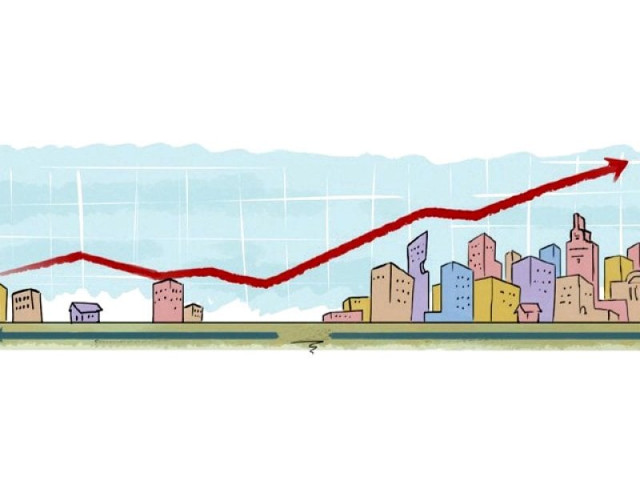Education vs property: where to invest
In the long run, property investment has higher residual value.

In Pakistan, like many other countries in the world, it is widely believed that property boom is about to return and this might be the right time to start investing in property. ILLUSTRATION: JAMAL KHURSHID
The bricks and mortar are back – this time probably with a bigger bang. In the west of London, an average three or four-bedroom house is appreciating by £7,500 per month.
Dr Mohamed Nurullah, an associate professor of finance at Kingston University, made a statement, “My house is better than me as it is giving me more returns than my monthly takeaway salary.”
Although this was a light remark, it actually may have serious implications for resource allocation. For example, given a choice between spending on children’s education and buying property for their benefit, what should be the rational choice?
The answer may not be as simple as the question may suggest because it depends on a number of factors. The most important relevant factor is the level of current wealth of parents.
For wealthy parents, it makes sense to invest in property rather than investing significant sums in the education of their children. Such parents should send their children to state-run schools and academic institutions to save on the costs of education.
These savings, along with other funds, then must be used to buy property (and other similar assets) to construct an optimum portfolio of properties.
On the other hand, for people on the poor end of the spectrum, investing in education of their children may prove to be a better choice.

In Islamabad, for example, a terraced property in I-8 sector may very well fetch Rs45 million. With the current rate of increase in capital gain of about 20%, this property is expected to fetch a price of about Rs4.3 billion in 25 years.
This is an interesting figure – over 95-fold increase in the value of the house. In other words, if someone has Rs4.3 billion today, the person will be able to buy about 95 properties of Rs45 million each.
Someone facing a choice of investing in education (improving human capital) and buying property for investment purposes should consider the diagram. This is based on the assumption that someone invests Rs1 million in property today for a period of 25 years and enjoys a capital gain of 20% annually. The property also fetches an annual rental of 5% of the market value of the property.
Another person invests Rs1 million in educating himself and as a result enjoys Rs20,000 additional income per month (in terms of increase in salary).
By just looking at the cash-income, someone may conclude that investing in education (the purple line) is far superior than investing in property (the red line). The purple and red lines represent increase in salary (annualised) and the annual rental income, respectively.
However, when capital gain (the blue line) is also considered, investing in property does not do that bad. In fact, in the long run, capital gains on property and returns on education may very well be the same.
When total benefits from investing in property (rental plus capital gain) are considered, then investing in property is better in the long run, although in the short run investing in human capital remains a better choice.
The most important benefit of investing in property is that in the long run property investment has a higher residual value while investing in education is perishable (with the death of the person).
In Pakistan, like many other countries in the world, it is widely believed that property boom is about to return and this might be the right time to start investing in property. An upper-middle level property in Islamabad, for example, has doubled in price in the last five years.
While there may be many “Double Shahs” out in the market luring investors for quick bucks, an investor should consider doubling his investment in five years by investing in property in Pakistan. This is probably the safest investment in the current market conditions.
The writer is an economistand Ph.D from Cambridge University
Published in The Express Tribune, May 19th, 2014.
Like Business on Facebook, follow @TribuneBiz on Twitter to stay informed and join in the conversation.



















COMMENTS
Comments are moderated and generally will be posted if they are on-topic and not abusive.
For more information, please see our Comments FAQ